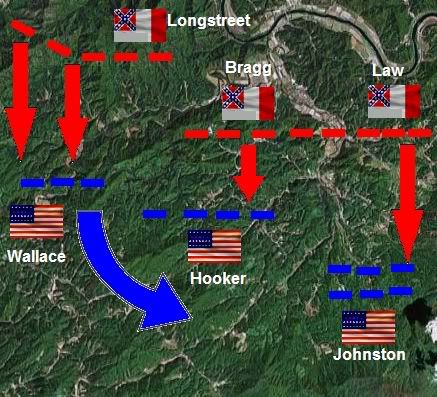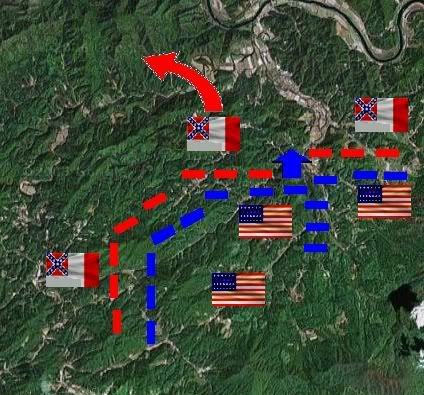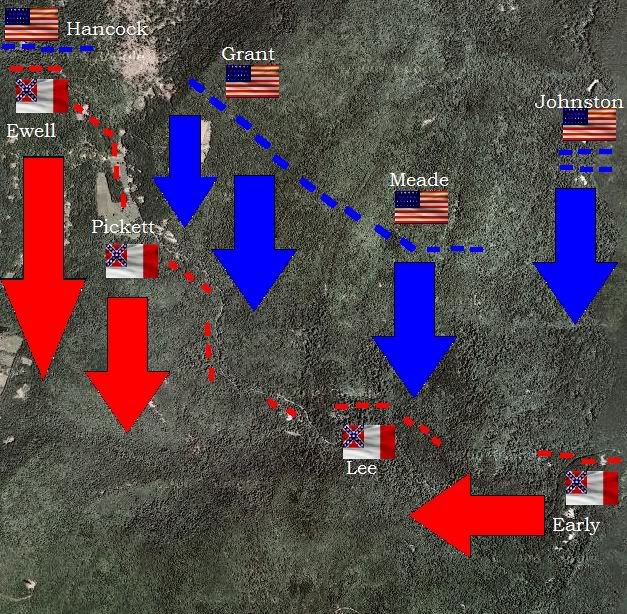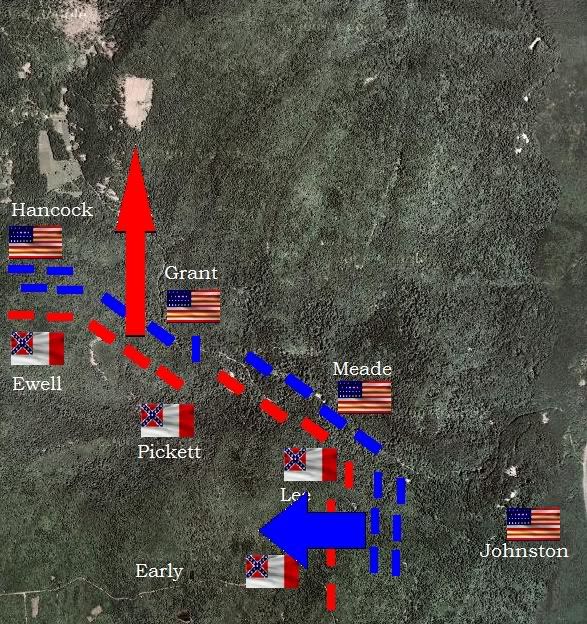Death at Smithfield
--
Union forces under Johnston had recaptured Maryland, but were delayed by weather and logistics from giving chase after Lee. President Brown took the opportunity to rob Lee of 1/2 his fighting strength. Under the command of General Jackson, 30,000 Confederate troops marched south into Lynchburg to meet up with 10,000 men who remained of Braxton Bragg’s western Army. Even as Sheridan and Sherman marched into Montgomery, Alabama, the Confederate Army fell back. Troops in the far south were absent of moral, and President Brown wanted Jackson to hold the line until French money could be used to finance the war further.
Union command realized the potential for Jackson to cause problems, and so sent an army to seize Saltville. The Confederates, still a good distance away from the salt mines, marched south to drive the Union force out. The Union command had been granted to General Meade, and his 50,000 men made quick work of the countryside as they marched north to engage Jackson. That engagement began outside the small country town of Blacksburg, near a rather wealthy plantation run by the Preston family. The plantation house, known as Smithfield, served as the Confederate base of command for the battle.
Smithfield Plantation House
The Confederate army aligned across a 2 mile wide field and held firm as the Union assault came at them. Meade hoped to use his numbers to dislodge Jackson and put the army to route. He failed, and was shot from his horse during the charge. Meade’s death was but a footnote in the battle in which five generals were slain. Meade was the first, and was followed rapidly by the death of the Confederate General Nathan Bedford Forrest, and then General Wade Hampton the III, both of whom were killed when they led a cavalry counter charge against the Union lines. Finally, as the Union charge disintegrated and the Federal army retreated, General Hooker, who had taken command after Meade’s death, was killed by an exploding cannon nearby.
The result was a rebel victory, but a costly one. Of the 40,000 men Jackson had deployed, only 25,000 were in completely working shape. Of the losses, 7,000 were casualties and the rest desertions. The Union lost almost as many to fire and half again as many to desertions. Both side saw their moral plummet. But for the Union the losses could be replaced, the Confederates were not so lucky. Jackson immediately set off south after his scuffle, but the army was too tired and too disheartened to be much good. By the time he reached Carolina, the war was won. Sheridan and Sherman had pressed what Confederate armies stood against them back into the sea. When Jackson failed to arrive on time, the Confederate army of the South, commanded by Robert Ransom, surrendered to the Union.
Jackson fled South Carolina to try and reach Virginia. But a new Union offensive had taken Lynchburg without a fight and was marching on Petersburg, south of Richmond. Jackson had nowhere to turn to and his army abandoned him. His hard approach to the war and his stiff discipline was just too much for the country boys whose homes were now gone. When Jackson returned to Lee with a scant 4,000 men, Lee knew the fight was over. President Brown and his cabinet looked to flee. Brown himself took ship to France, and on January 6th, 1868 the Confederate Army of Northern Virginia was trapped in a little church known as St. Stephens. Lee knew he would only bring death, and so surrendered to the Federal general Albert Johnston.
Even in surrender, the men of the Confederacy loved their “Old Virginian”
From there the Three Wars of 1866 ended quickly. Mexico, realizing that the full might of the Union could now be directed on the weakening army of the Rio Grande (which had taken large tracts of Texas) quickly capitulated. Albert Johnston marched a fresh 20,000 man army into Austin, and was greeted as a liberator. The Mexicans ceded the land south the Rio Grande, including control of Matamoros, the San Juan river and many border cities. The good news was made greater when George Armstrong Custer reappeared in Central America at head the head of a long prisoner train including untold thousands of USCA and CSA soldiers. Victory was won on all fronts seemingly overnight. And yet, the darkness of the future was not yet cleared. America had, for three years, beaten itself into near oblivion, and now someone had to pick up the pieces.








